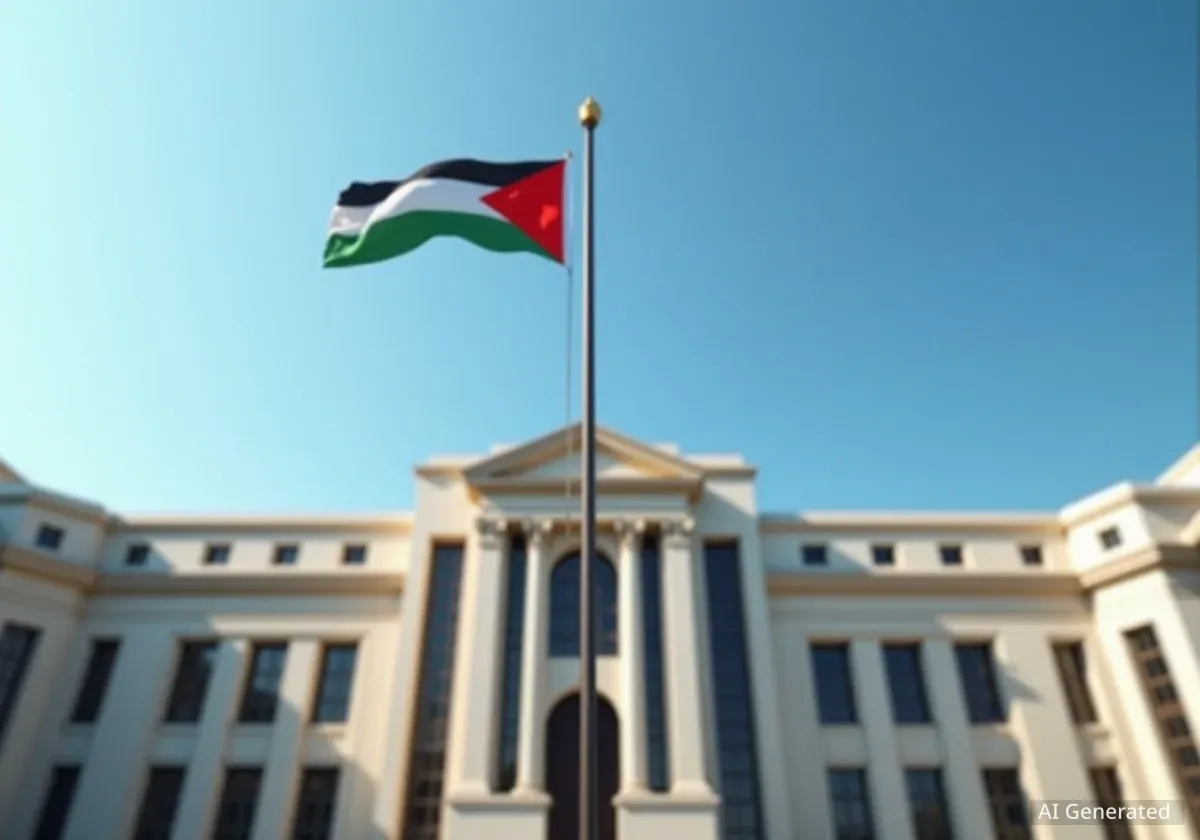Recent international events have drawn significant attention, spanning political developments, ongoing conflicts, and unexpected discoveries. From diplomatic shifts in the Middle East to archaeological finds, these stories highlight the complex and dynamic nature of global affairs.
Key Takeaways
- Several nations have announced formal recognition of a Palestinian state.
- Tensions in the Middle East continue with intense military actions.
- Protests by young people in Peru have led to clashes with authorities.
- A World War II bomb was safely defused in Hong Kong.
Diplomatic Shifts for Palestine
In a notable development, the Australian Prime Minister has formally announced Australia's recognition of the State of Palestine. This decision aligns with a growing trend among some international governments to acknowledge Palestine's statehood. The announcement was made during a press briefing, emphasizing a commitment to a two-state solution.
Similarly, the United Kingdom has also declared its intention to recognize the State of Palestine. This move signals a significant shift in UK foreign policy regarding the Israeli-Palestinian conflict. Details surrounding the timing and specific conditions of this recognition are expected to be further elaborated by UK officials.
Background on State Recognition
The recognition of a state is a complex process in international law and diplomacy. It involves acknowledging a political entity as a sovereign state, typically with defined territory, a permanent population, a government, and the capacity to enter into relations with other states. Historically, recognition can be bilateral (one state recognizing another) or collective (through international bodies like the United Nations).
Ongoing Conflicts in Gaza
The situation in Gaza City remains critical, with reports of relentless attacks. Israeli forces have continued their military operations, leading to significant destruction and humanitarian concerns. International organizations have expressed deep worry about the impact on civilian populations and infrastructure.
These actions are part of an extended conflict that has seen a severe escalation in recent months. The humanitarian crisis in the region has intensified, with calls from global leaders for de-escalation and protection of civilians. The number of displaced persons and casualties continues to rise.
"The international community must prioritize efforts to protect civilians and ensure humanitarian aid reaches those in desperate need in Gaza," stated a spokesperson for a major aid organization.
Humanitarian Impact
- Over 2 million people reside in Gaza, a densely populated area.
- Recent reports indicate widespread displacement and shortages of essential supplies.
- Hospitals are struggling to cope with the influx of injured individuals.
Protests in Peru
In Lima, Peru, Generation Z protesters have engaged in clashes with police. These demonstrations highlight ongoing social and political tensions within the country. Young activists have taken to the streets to voice their concerns over various issues, including government policies and economic conditions.
The protests have often turned confrontational, with police deploying crowd control measures. The motivations behind these demonstrations are diverse, reflecting a broader dissatisfaction among younger segments of the population with the current state of affairs in Peru.
Youth Activism
Globally, youth activism has become a prominent force in political and social movements. Young people are increasingly using digital platforms to organize and amplify their voices, demanding change on issues ranging from climate action to social justice. The protests in Peru exemplify this trend of youth engagement in national discourse.
World War II Bomb Discovery in Hong Kong
Construction workers in Hong Kong made an unexpected discovery when they unearthed a World War II bomb at a building site. Police and explosive ordnance disposal teams were quickly dispatched to the scene. The area was secured, and operations began to safely defuse the device.
The bomb was identified as a relic from the Second World War, a period when Hong Kong was under Japanese occupation. Such discoveries are not uncommon in the city, given its history. However, each incident requires careful handling to ensure public safety.
Safe Disposal Protocol
The Hong Kong police confirmed that the bomb was successfully defused without incident. This operation involved specialized techniques to render the explosive safe. Authorities routinely train for such scenarios, ensuring they can respond effectively to historical ordnance finds.
Historical Context
During World War II, Hong Kong experienced significant aerial bombardment and ground combat. Many unexploded ordinances (UXO) from that period remain buried across the territory, particularly in areas that saw heavy fighting or were targets of air raids. Construction projects frequently lead to their discovery.
Political Commentary and Free Speech
Amidst these global events, political commentary continues to generate discussion. For example, former President Trump reportedly honored Charlie Kirk as a 'martyr for American freedom' at a memorial event. This statement reflects a particular viewpoint on free speech and political expression.
Conversely, supporters of figures like Jimmy Kimmel have expressed concerns about the erosion of free speech. These discussions often revolve around the boundaries of expression, the role of media, and the implications for public discourse. The concept of free speech remains a central topic in various political contexts.
The varying interpretations of free speech highlight ongoing debates about media influence and political rhetoric in modern society. These discussions are integral to understanding public opinion and political polarization in many countries.




